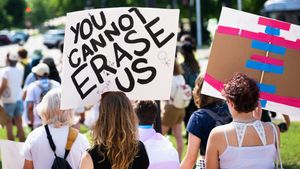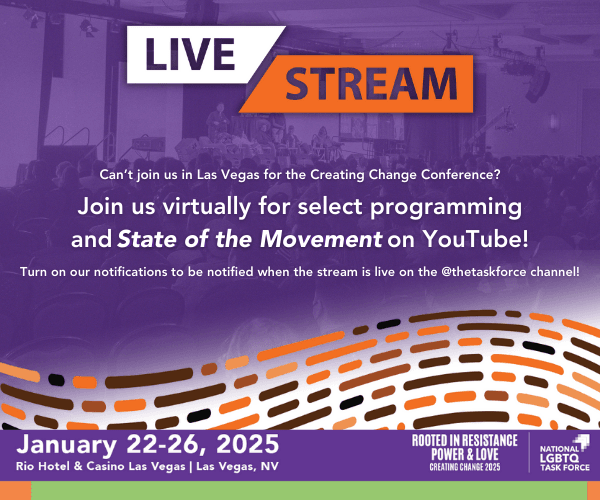The Supreme Court's pending decision in United States v. Skrmetti could determine whether transgender youth have access to life-saving medical care or whether our government will sacrifice their rights to a growing wave of political attacks. At issue is Tennessee's ban on gender-affirming care for minors, a law that threatens to codify discrimination and spark a nationwide public health crisis. The stakes couldn't be higher for trans youth, their families, and for the integrity of equitable healthcare in America.
Trans Lives Are on The Line
Transgender youth are among the most vulnerable populations in the United States. They face alarmingly high rates of depression, anxiety, and suicidal ideation compared to their cisgender peers. One national study published in 2017 by the Centers for Disease Control and Prevention found that 35% of transgender youth had attempted suicide, and 44% had considered it. These are not just statistics -- they are cries for help from young people who yearn for validation, understanding, and care.
Gender-affirming medical care includes many different social, medical, and psychological interventions designed to support people whose gender identity does not align with the sex they were assigned at birth. Although gender-affirming care can involve individualized medical services, like puberty blockers and hormone therapy, it is also a public health strategy that reduces suicide rates, improves mental health, and promotes overall well-being. Major medical organizations, including the American Academy of Pediatrics and the Endocrine Society, endorse these treatments as evidence-based and medically necessary. For many trans youths, this care is life-saving.
Should the Supreme Court side with Tennessee, the ripple effects will extend beyond the state's borders. Such a ruling would embolden other states to enact similar bans, creating a patchwork of access where life-saving care is available to some young people and denied to others based on geography. This trend would exacerbate existing disparities and further isolate trans youth in hostile regions.
A Public Health Disaster for Everyone
An unfavorable ruling in US v. Skrmetti would have far-reaching consequences for public health. First, it would institutionalize discrimination, sending a harmful message that trans youth and their families are not entitled to the same standard of care as others. This stigma will worsen the mental health challenges faced by transgender individuals. Researchers have already demonstrated that a rise in state-level anti-transgender legislation has led to more suicide attempts among transgender youth.
 Nikki Aye for The Advocate
Nikki Aye for The Advocate
Second, when institutions deny transgender people access to gender-affirming care, the consequences ripple outward, placing strain on community resources. Higher suicide rates and untreated mental health conditions among transgender youth could increase healthcare costs and overburden mental health and emergency services. Additionally, the economic fallout from marginalized individuals losing access to education and employment due to untreated health conditions affects society at large. Addressing these issues is about individual well-being and the collective health of our communities.
Third, an unfavorable ruling would undermine the principle of health equity. Low-income families and families of color, who already face barriers to healthcare, would be disproportionately affected by such bans. While wealthier families might be able to travel long distances to states where gender-affirming care remains accessible, those without financial resources would be left with few, if any, options.
Finally, the ruling could set a dangerous precedent for the politicization of healthcare. Allowing lawmakers to override the medical consensus on gender-affirming care opens the door to future bans on other treatments, including contraception, abortion, and vaccines. This erosion of evidence-based policymaking puts all of us at risk.
The mission of public health is to serve everyone, especially those at greatest risk. Denying gender-affirming care violates this core principle and abandons a group already struggling against significant barriers. When public health fails the most vulnerable, it fails society.
The Psychological Toll
The potential damage extends beyond the denial of medical care. An adverse ruling would signal to transgender youths that their identities are invalid and that their existence is subject to the whims of political power. This kind of institutional marginalization has profound psychological consequences.
Minority stress theory, a cornerstone of public health research, shows that stigma and discrimination create chronic stress, leading to worse mental, physical, and cognitive health outcomes for marginalized groups. For transgender youth who already contend with bullying, family rejection, and societal hostility, this ruling could amplify feelings of hopelessness and isolation.
 Halfpoint via shutterstock
Halfpoint via shutterstock
The harm extends beyond physical and mental health. Discrimination in healthcare and policies like Tennessee's ban also disrupt transgender youth's ability to thrive in school, secure employment, and participate fully in society. These social determinants of health -- education, economic opportunity, and community belonging -- are critical components of overall well-being, and their erosion compounds the public health crisis.
A Precarious Legal Landscape
While the Court's decision will technically address Tennessee's law, its implications could reshape the legal landscape nationwide for LGBTQ+ rights in healthcare. If the Court rules in favor of the ban, it will shift the federal judiciary's approach to anti-discrimination protections, particularly under the Affordable Care Act and Title IX.
Codifying such overt discrimination against transgender youth could embolden states to enact increasingly draconian measures under the guise of "protecting children." Already, many states have proposed or passed legislation targeting LGBTQ+ rights, from bans on drag performances to restrictions on LGBTQ+ content in schools. An unfavorable ruling in US v. Skrmetti would accelerate this trend.
LGBTQ+ Communities and Allies Can Resist
As we await the Court's decision, the LGBTQ+ community and allies can prepare for the possibility of an unfavorable ruling, and we can commit to action, regardless of the outcome.
One path forward is to support legal challenges to discriminatory policy. Organizations like the ACLU, Lambda Legal, and the Human Rights Campaign fight these laws in courts nationwide. Their work is essential to counteracting the potential fallout from US v. Skrmetti.
Advocates can also continue working to achieve stronger federal protection for transgender people. Now more than ever, advocates can push Congress to prioritize comprehensive protections for LGBTQ+ individuals, like those outlined in the Equality Act. Federal legislation could preempt state-level bans and safeguard access to gender-affirming care.
State and local governments can also push forward protections for transgender people. For instance, some states have expanded Medicaid to cover gender-affirming services. Other states and cities have passed "sanctuary" or "shield" laws that allow transgender youths and their families from outside states to access care and legal support within the sanctuary jurisdiction. These policies allow states to show solidarity with transgender youths who live in more hostile political environments.
 Gerry Matthews/Shutterstock
Gerry Matthews/Shutterstock
Educating the public about transgender people and the importance of gender-affirming healthcare could also be part of the resistance. Misinformation has fueled the wave of anti-transgender legislation. Advocates could amplify the voices of health and medical experts, transgender individuals, and their families to dispel harmful myths about gender-affirming care.
Bolstering community support is another vital step in fighting against discriminatory policy. LGBTQ+ organizations, affirming healthcare providers and mental health professionals could support transgender youth and their families. Grassroots networks can help connect families with resources, even in hostile states.
Finally, cisgender people can engage in allyship. Allies could speak out against discriminatory policies and use their platforms to advocate for transgender rights.
Whether through voting, organizing or just showing up every effort matters.
Transgender People's Futures Are Worth Fighting For
The Supreme Court has yet to decide US v. Skrmetti, but the stakes are clear. An unfavorable ruling would jeopardize the health and safety of transgender youth, deepen health inequities, and set a dangerous precedent for the politicization of medicine.
The road ahead will be long, but history has shown that the LGBTQ+ community is resilient and resourceful. Together, justice-minded communities can resist this assault on transgender people's rights and build a future where every young person, regardless of their gender identity, can access the care they need to lead healthy, fulfilling lives.
Because public health, like justice, must include everyone.
Harry Barbee is an Assistant Professor at the Johns Hopkins Bloomberg School of Public Health and a nationally recognized expert in LGBTQ+ health research.
Voices is dedicated to featuring a wide range of inspiring personal stories and impactful opinions from the LGBTQ+ and Allied community. Visit advocate.com/submit to learn more about submission guidelines. We welcome your thoughts and feedback on any of our stories. Email us at voices@equalpride.com. Views expressed in Voices stories are those of the guest writers, columnists and editors, and do not directly represent the views of The Advocate or our parent company, equalpride.
































 Nikki Aye for The Advocate
Nikki Aye for The Advocate Halfpoint via shutterstock
Halfpoint via shutterstock Gerry Matthews/Shutterstock
Gerry Matthews/Shutterstock





















































